MGMT 1601 Property Law Assignment: Analyzing Landlord-Tenant Cases
VerifiedAdded on 2023/04/08
|5
|820
|489
Homework Assignment
AI Summary
This assignment delves into various legal principles governing landlord-tenant relationships, referencing the Residential Tenancies Act. It analyzes four distinct cases, covering scenarios such as rent arrears, deductions from security deposits, liability for property damage, and the responsibility for maintaining essential services. Each case examines the rights and obligations of both landlords and tenants, determining potential liabilities and remedies available under the law. The analysis includes references to relevant sections of the Residential Tenancies Act to support the conclusions. Desklib offers a wealth of resources, including past papers and solved assignments, to aid students in their academic pursuits.
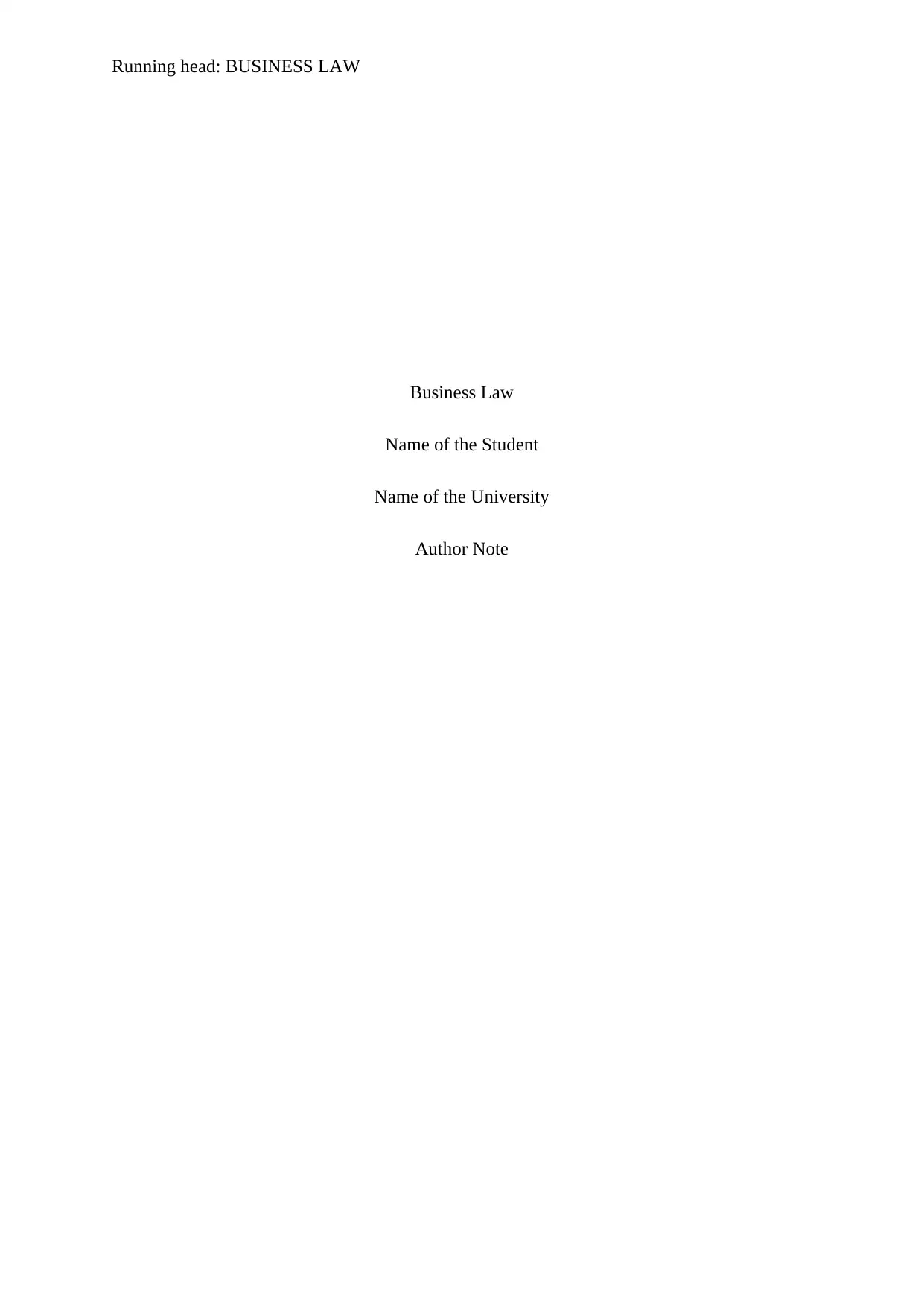
Running head: BUSINESS LAW
Business Law
Name of the Student
Name of the University
Author Note
Business Law
Name of the Student
Name of the University
Author Note
Paraphrase This Document
Need a fresh take? Get an instant paraphrase of this document with our AI Paraphraser
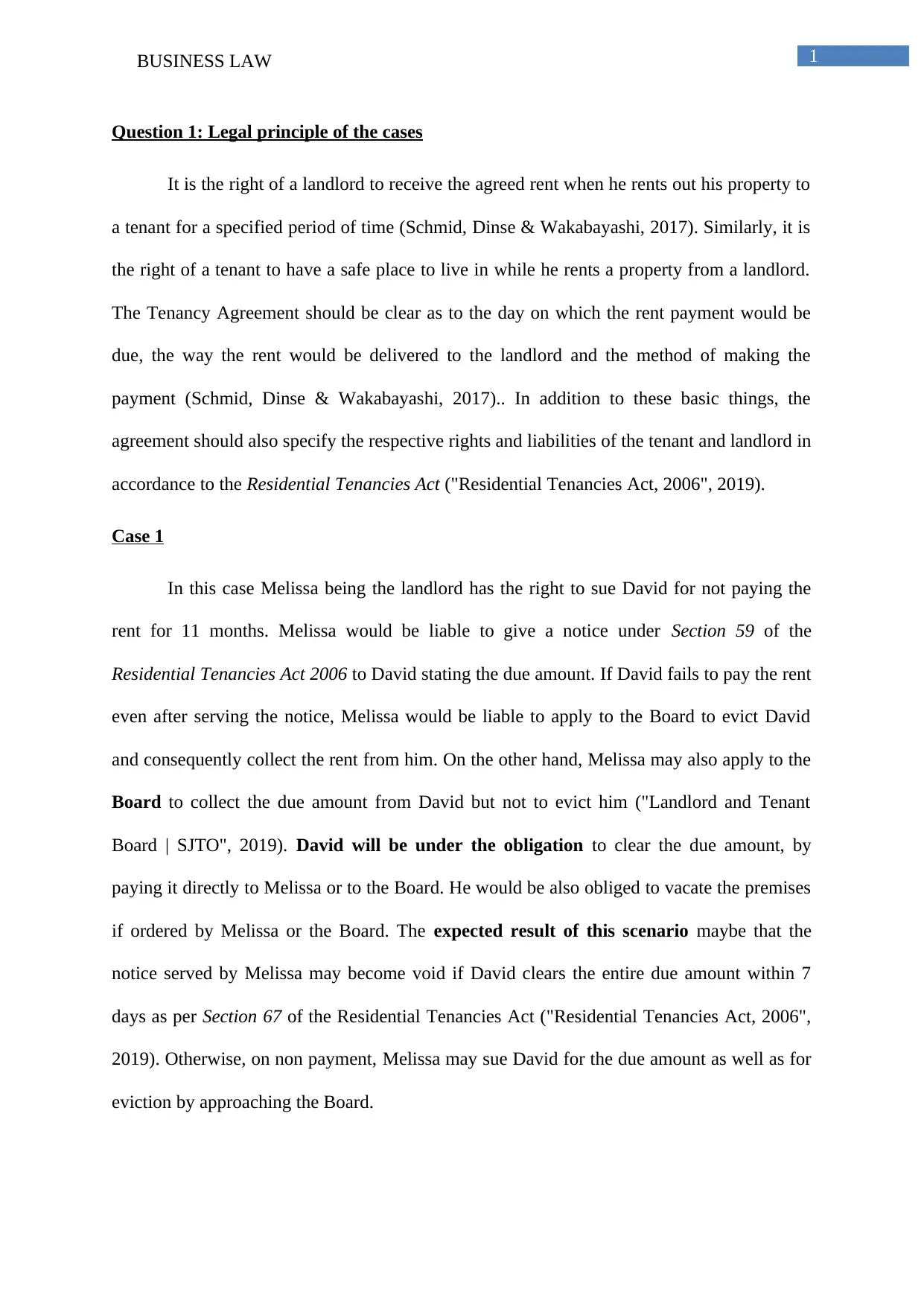
1BUSINESS LAW
Question 1: Legal principle of the cases
It is the right of a landlord to receive the agreed rent when he rents out his property to
a tenant for a specified period of time (Schmid, Dinse & Wakabayashi, 2017). Similarly, it is
the right of a tenant to have a safe place to live in while he rents a property from a landlord.
The Tenancy Agreement should be clear as to the day on which the rent payment would be
due, the way the rent would be delivered to the landlord and the method of making the
payment (Schmid, Dinse & Wakabayashi, 2017).. In addition to these basic things, the
agreement should also specify the respective rights and liabilities of the tenant and landlord in
accordance to the Residential Tenancies Act ("Residential Tenancies Act, 2006", 2019).
Case 1
In this case Melissa being the landlord has the right to sue David for not paying the
rent for 11 months. Melissa would be liable to give a notice under Section 59 of the
Residential Tenancies Act 2006 to David stating the due amount. If David fails to pay the rent
even after serving the notice, Melissa would be liable to apply to the Board to evict David
and consequently collect the rent from him. On the other hand, Melissa may also apply to the
Board to collect the due amount from David but not to evict him ("Landlord and Tenant
Board | SJTO", 2019). David will be under the obligation to clear the due amount, by
paying it directly to Melissa or to the Board. He would be also obliged to vacate the premises
if ordered by Melissa or the Board. The expected result of this scenario maybe that the
notice served by Melissa may become void if David clears the entire due amount within 7
days as per Section 67 of the Residential Tenancies Act ("Residential Tenancies Act, 2006",
2019). Otherwise, on non payment, Melissa may sue David for the due amount as well as for
eviction by approaching the Board.
Question 1: Legal principle of the cases
It is the right of a landlord to receive the agreed rent when he rents out his property to
a tenant for a specified period of time (Schmid, Dinse & Wakabayashi, 2017). Similarly, it is
the right of a tenant to have a safe place to live in while he rents a property from a landlord.
The Tenancy Agreement should be clear as to the day on which the rent payment would be
due, the way the rent would be delivered to the landlord and the method of making the
payment (Schmid, Dinse & Wakabayashi, 2017).. In addition to these basic things, the
agreement should also specify the respective rights and liabilities of the tenant and landlord in
accordance to the Residential Tenancies Act ("Residential Tenancies Act, 2006", 2019).
Case 1
In this case Melissa being the landlord has the right to sue David for not paying the
rent for 11 months. Melissa would be liable to give a notice under Section 59 of the
Residential Tenancies Act 2006 to David stating the due amount. If David fails to pay the rent
even after serving the notice, Melissa would be liable to apply to the Board to evict David
and consequently collect the rent from him. On the other hand, Melissa may also apply to the
Board to collect the due amount from David but not to evict him ("Landlord and Tenant
Board | SJTO", 2019). David will be under the obligation to clear the due amount, by
paying it directly to Melissa or to the Board. He would be also obliged to vacate the premises
if ordered by Melissa or the Board. The expected result of this scenario maybe that the
notice served by Melissa may become void if David clears the entire due amount within 7
days as per Section 67 of the Residential Tenancies Act ("Residential Tenancies Act, 2006",
2019). Otherwise, on non payment, Melissa may sue David for the due amount as well as for
eviction by approaching the Board.
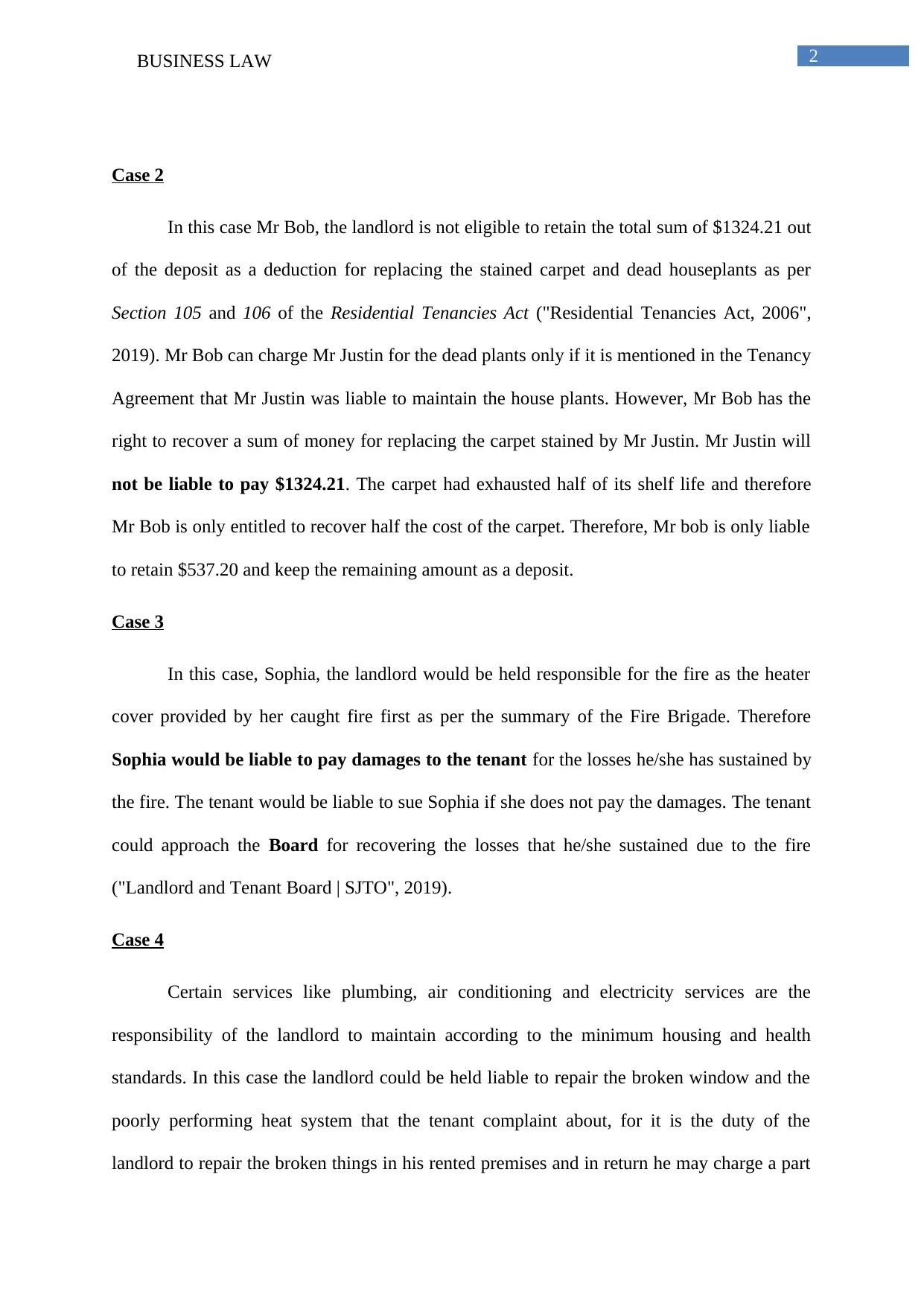
2BUSINESS LAW
Case 2
In this case Mr Bob, the landlord is not eligible to retain the total sum of $1324.21 out
of the deposit as a deduction for replacing the stained carpet and dead houseplants as per
Section 105 and 106 of the Residential Tenancies Act ("Residential Tenancies Act, 2006",
2019). Mr Bob can charge Mr Justin for the dead plants only if it is mentioned in the Tenancy
Agreement that Mr Justin was liable to maintain the house plants. However, Mr Bob has the
right to recover a sum of money for replacing the carpet stained by Mr Justin. Mr Justin will
not be liable to pay $1324.21. The carpet had exhausted half of its shelf life and therefore
Mr Bob is only entitled to recover half the cost of the carpet. Therefore, Mr bob is only liable
to retain $537.20 and keep the remaining amount as a deposit.
Case 3
In this case, Sophia, the landlord would be held responsible for the fire as the heater
cover provided by her caught fire first as per the summary of the Fire Brigade. Therefore
Sophia would be liable to pay damages to the tenant for the losses he/she has sustained by
the fire. The tenant would be liable to sue Sophia if she does not pay the damages. The tenant
could approach the Board for recovering the losses that he/she sustained due to the fire
("Landlord and Tenant Board | SJTO", 2019).
Case 4
Certain services like plumbing, air conditioning and electricity services are the
responsibility of the landlord to maintain according to the minimum housing and health
standards. In this case the landlord could be held liable to repair the broken window and the
poorly performing heat system that the tenant complaint about, for it is the duty of the
landlord to repair the broken things in his rented premises and in return he may charge a part
Case 2
In this case Mr Bob, the landlord is not eligible to retain the total sum of $1324.21 out
of the deposit as a deduction for replacing the stained carpet and dead houseplants as per
Section 105 and 106 of the Residential Tenancies Act ("Residential Tenancies Act, 2006",
2019). Mr Bob can charge Mr Justin for the dead plants only if it is mentioned in the Tenancy
Agreement that Mr Justin was liable to maintain the house plants. However, Mr Bob has the
right to recover a sum of money for replacing the carpet stained by Mr Justin. Mr Justin will
not be liable to pay $1324.21. The carpet had exhausted half of its shelf life and therefore
Mr Bob is only entitled to recover half the cost of the carpet. Therefore, Mr bob is only liable
to retain $537.20 and keep the remaining amount as a deposit.
Case 3
In this case, Sophia, the landlord would be held responsible for the fire as the heater
cover provided by her caught fire first as per the summary of the Fire Brigade. Therefore
Sophia would be liable to pay damages to the tenant for the losses he/she has sustained by
the fire. The tenant would be liable to sue Sophia if she does not pay the damages. The tenant
could approach the Board for recovering the losses that he/she sustained due to the fire
("Landlord and Tenant Board | SJTO", 2019).
Case 4
Certain services like plumbing, air conditioning and electricity services are the
responsibility of the landlord to maintain according to the minimum housing and health
standards. In this case the landlord could be held liable to repair the broken window and the
poorly performing heat system that the tenant complaint about, for it is the duty of the
landlord to repair the broken things in his rented premises and in return he may charge a part
⊘ This is a preview!⊘
Do you want full access?
Subscribe today to unlock all pages.

Trusted by 1+ million students worldwide
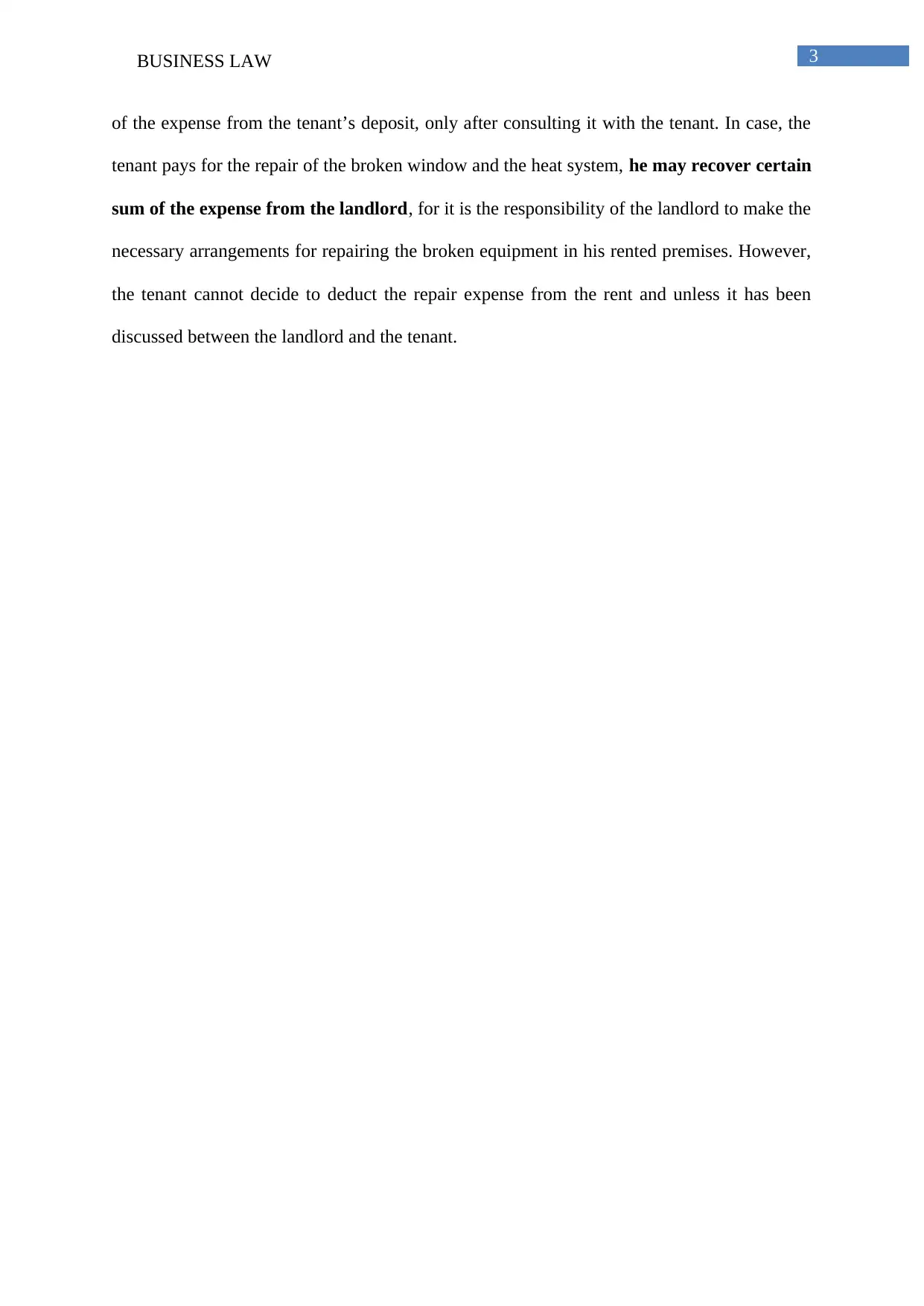
3BUSINESS LAW
of the expense from the tenant’s deposit, only after consulting it with the tenant. In case, the
tenant pays for the repair of the broken window and the heat system, he may recover certain
sum of the expense from the landlord, for it is the responsibility of the landlord to make the
necessary arrangements for repairing the broken equipment in his rented premises. However,
the tenant cannot decide to deduct the repair expense from the rent and unless it has been
discussed between the landlord and the tenant.
of the expense from the tenant’s deposit, only after consulting it with the tenant. In case, the
tenant pays for the repair of the broken window and the heat system, he may recover certain
sum of the expense from the landlord, for it is the responsibility of the landlord to make the
necessary arrangements for repairing the broken equipment in his rented premises. However,
the tenant cannot decide to deduct the repair expense from the rent and unless it has been
discussed between the landlord and the tenant.
Paraphrase This Document
Need a fresh take? Get an instant paraphrase of this document with our AI Paraphraser
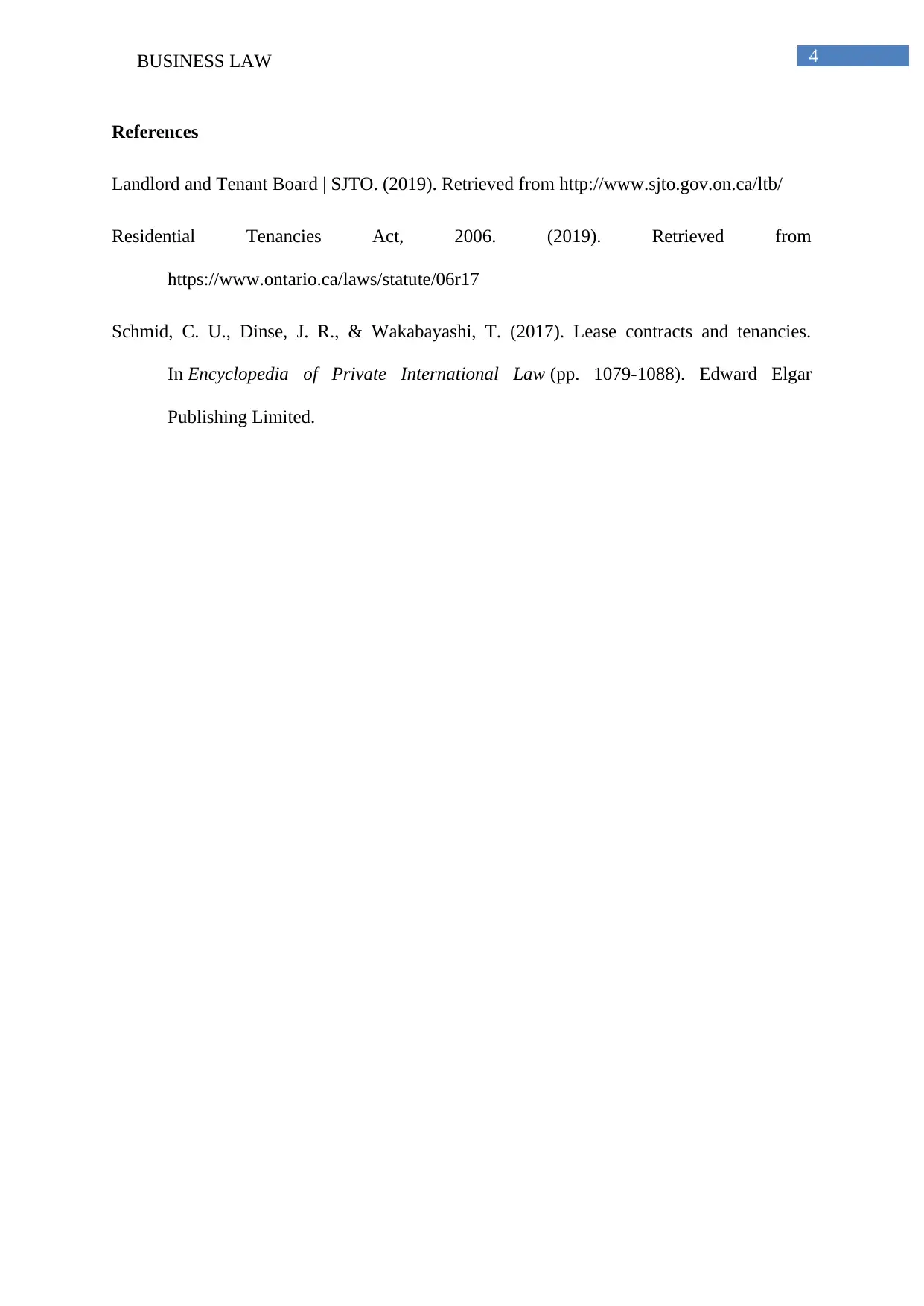
4BUSINESS LAW
References
Landlord and Tenant Board | SJTO. (2019). Retrieved from http://www.sjto.gov.on.ca/ltb/
Residential Tenancies Act, 2006. (2019). Retrieved from
https://www.ontario.ca/laws/statute/06r17
Schmid, C. U., Dinse, J. R., & Wakabayashi, T. (2017). Lease contracts and tenancies.
In Encyclopedia of Private International Law (pp. 1079-1088). Edward Elgar
Publishing Limited.
References
Landlord and Tenant Board | SJTO. (2019). Retrieved from http://www.sjto.gov.on.ca/ltb/
Residential Tenancies Act, 2006. (2019). Retrieved from
https://www.ontario.ca/laws/statute/06r17
Schmid, C. U., Dinse, J. R., & Wakabayashi, T. (2017). Lease contracts and tenancies.
In Encyclopedia of Private International Law (pp. 1079-1088). Edward Elgar
Publishing Limited.
1 out of 5
Related Documents
Your All-in-One AI-Powered Toolkit for Academic Success.
+13062052269
info@desklib.com
Available 24*7 on WhatsApp / Email
![[object Object]](/_next/static/media/star-bottom.7253800d.svg)
Unlock your academic potential
Copyright © 2020–2026 A2Z Services. All Rights Reserved. Developed and managed by ZUCOL.




